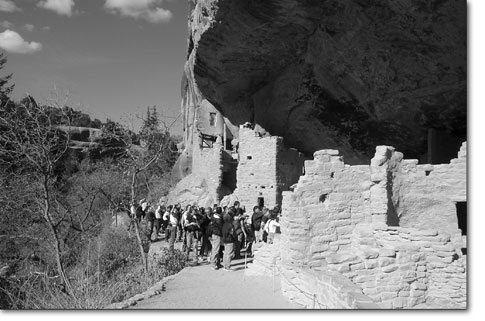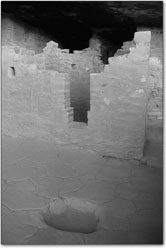|
|
||||
|
National Park System
faces peril
by Will Sands The sound of off-road vehicles, sight of tour planes and the bustle of crowded special events could characterize a visit to Mesa Verde’s Cliff Palace if a proposed rule-change comes to pass. Watchdog groups throughout the nation are outraged by what they say is an attempt by the Department of Interior to “hijack” the National Park System. There is fear that national parks with fragile cultural resources, like nearby Mesa Verde and Chaco Canyon, could be in the greatest danger. “Under the changes, the sights, sounds and smells of motorized vehicles would dominate previously quiet parks,” said Jerry Rogers, of the Coalition of National Park Service Retirees. “These rule changes would unleash on our national parks an army of off-road vehicles, dirt bikes, jet skis, powerboats, dune buggies and the like.” The Coalition of National Park Service Retirees, a watchdog group composed of 410 former park service employees, is still weighing the impacts of a proposed revision to the National Park Service rulebook. However, that group and others are already pointing accusatory fingers at Paul Hoffman, deputy assistant secretary of the Department of Interior, who has been working in private on the ambitious rewrite of the guidelines for two years. A draft of Hoffman’s draft was leaked to the public last week. Park Service policies are typically revisited every 10 to 15 years in an effort to make sure that the rules for the 388 sites on the system are up to date. The document was last revised in 2000. However, unlike the 2000 revision, the Hoffman draft contains line-by-line changes to the text and a sweeping shift in the Park Service mission. Also, unlike the prior rewrite, Hoffman did his work secretly away from public oversight. “What’s unusual about this is that it was a totally internal process,” said Ron Tipton, of the National Parks Conservation Association, another watchdog group. “This is also not a slight rewrite. It’s a whole policy change, revised line-by-line. What really concerns us is there seems to be a plan to adopt this very, very quickly.” By doing things like encouraging motorized use and elevating mining and grazing to “park purposes,” the Hoffman draft challenge 90 years of Park Service laws, according to the opposing groups. In particular, they put a premium on public use at the expense of preservation. “The biggest single concern about the rewrite is how the parks are going to be managed and whether the never-ending balance of preservation and use can be maintained,” Tipton said. The current balance could go completely out the window if the revision is adopted, Tipton said. According to the Hoffman draft, damage will be discouraged only if it is considered “irreversible.”
“The draft says that park resources will be impaired only if the damage is ‘irreversible,’” Tipton said. “The only thing I can think of that’s ‘irreversible’ is the loss of an endangered species. You can find a way to permit almost anything under this draft.” Rogers, of the Coalition of National Park Service Retirees, agreed, saying that the Hoffman draft could undo nearly a century of progress for national parks. “It is ludicrous to require a superintendent to wait to take action on resources degradation until ‘irreversible’ damage can be documented,” he said. “The old aphorism about closing the barn door after the horse gets out comes to mind.” Something as unusual as a rock concert at the Great Sand Dunes National Park could happen under the proposed rewrite, according to the coalition. The new draft places a premium on special events, meaning things like concerts and reenactments would be welcome at national parks. “Britney Spears could hold a major concert at nearly any national park,” Bill Wade, of the coalition, said. “The new rules significantly increase the emphasis on permitting public uses over the traditional mission of preserving historic and natural places.” Though Spears might be unlikely to select Mesa Verde or Chaco Canyon for tour stops, parks with a cultural bent are particularly sensitive to the changes, according to Tipton. Not only do the parks have fragile ecosystems, their focus is on the preservation of a fragile cultural heritage. “You take Mesa Verde, Chaco Canyon or Canyonlands, and they all have fragile and very vulnerable cultural resources,” Tipton explained. “The current park policy is to place that preservation first and foremost.” With the Hoffman rewrite, preservation would no longer be the leading goal of superintendents at those parks. “The whole thrust of the rewrite is you have to let the public enjoy the park and you have to accommodate as many types of uses as possible,” Tipton said. “The park system is now there primarily for recreation. I believe it will call into question the kinds of careful management you currently have in places like Mesa Verde.” Groups like the National Parks Conservation Association, Coalition of National Park Service Retirees, the Wilderness Society, the Natural Resources Defense Council and the Friends of the Earth are all currently pressing the panic button over the Hoffman draft. However, they also concede that it remains a draft and are mobilizing efforts to prevent it from becoming law. For his part, Tipton is certain that the public will see through the rewrite and send Hoffman back to the drawing board. “I’m confident that the park-visiting public in Colorado and those that come from all over to Mesa Verde, the Black Canyon of the Gunnison and the rest of Colorado’s parks will not be happy with the kind of policy changes that have been suggested,” he concluded. A Department of Interior spokesperson neglected to return the Telegraph’s phone calls. •
|
In this week's issue...
- May 15, 2025
- End of the trail
Despite tariff pause, Colorado bike company can’t hang on through supply chain chaos
- May 8, 2025
- Shared pain
Dismal trend highlights need to cut usage in Upper Basin, too
- April 24, 2025
- A tale of two bills
Nuclear gets all the hype, but optimizing infrastructure will have bigger impact



